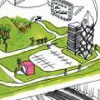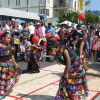Would you like a re:Streets charrette in your city?
re:Streets is a multi-disciplinary collaboration focused on the planning, design and construction of streets as a method for improving our built environment. It pushes beyond the current standards to explore the future of streets and what America’s roadways would be like if they were designed for living, instead of driving.
If you are interested in having a charrette in your city, please call Mukul Malhotra at (510) 845-7549.
Here are some of the cities where re:Streets charrettes have already been held:
The re:Streets workshop will be an important opportunity for staff from a range of city bureaus, engineers and design professionals to have a focused discussion to begin to answer these questions and to explore new approaches to the design and management of city streets. This one-and-a-half day workshop will take a fresh, multi-objective look at the future of streets, how they are designed and used, and their relationship to the places they pass through. Two very different streets will be selected to provide the context and focus for the workshop.
Objectives
- Explore multi-benefit solutions (common space, reduced urban heat island effects, habitat connectivity, stormwater treatment, pedestrian and bicycle safety, etc.) for challenging street projects
- Integrate consideration of the surrounding context (land uses, built and natural environment) together with community needs for public space and mobility into a unified street design process
- Bring together a multi-disciplinary, multi-bureau team to share expertise towards common goals
- Build inter-bureau partnerships for future projects.
Outcomes
- Generate ideas that could serve as the basis for new approaches to multi-objective street design and management
- Identify implementation approaches focused on at least two levels of infrastructure intervention and investment–low-cost, near-term solutions and comprehensive street redesign/rebuild
Who facilitates re:Streets charrettes?
The re:Streets Team from MIG will bring international examples of multi-faceted solutions to the design and use of streets. Through their presentation and facilitation, they will help guide the workshop to explore how to develop corridors and streetscapes that are multifunctional, sustainable, green, and cost-effective to maintain.
Mukul Malhotra, Principal and Director of Urban Design
Mukul has over 15 years of experience in urban design and architecture. Since joining MIG in 2000, he has managed and contributed to a wide range of planning and design projects, addressing issues related to urban development and revitalization, pedestrian- and transit-oriented design, community connectivity, and preservation of neighborhood and city character. A leader and innovator on Complete Streets, he has worked with an array of cities, agencies and communities in efforts to redevelop corridors and streetscapes throughout the nation.
Daniel Iacofano, Ph.D., FAICP, FASLA, Founding Principal
Daniel Iacofano has over 25 years of experience in community planning, urban design, facilitation, public and stakeholder outreach. He has managed and facilitated a wide range of planning studies, addressing issues related to land use, growth strategies, and urban development and revitalization. Dr. Iacofano has combined his planning expertise with public involvement and facilitation techniques to assist numerous communities and developers in articulating goals, visions, and strategies for future planning. He is the author of The Inclusive City, a collection of project studies highlighting the best of universal, inclusive design for buildings, neighborhoods and urban spaces.
Chris Beynon, AICP, Principal and Director of Planning and Design Services
Chris Beynon is a leader in planning, design and implementation for downtowns, corridors, transit station areas, neighborhoods and retail environments throughout North America. He has a proven track record of creating successful plans based on an understanding of market economics and development requirements; retail, cultural and entertainment district creation; the role of green space and the public realm in downtown revitalization; and the translation of visions and concepts into action-oriented projects, policies and programs.


